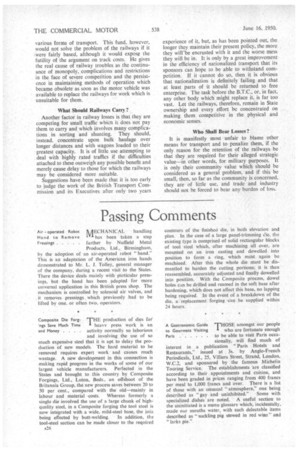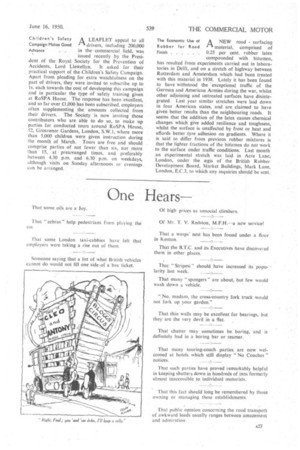Passing Comments
Page 28

Page 29

If you've noticed an error in this article please click here to report it so we can fix it.
Air operated Robot MECHANICAL handling Hand to Remove i" has been taken a step
Pressings farther by Nuffield Metal Products, Ltd.. Birmingham, by the adoption of an air-operated robot "hand." This is an adaptation of the American iron hands demonstrated to Mr. L. J. Tolley, general manager of the company, during a recent visit to the States. There the device deals mainly with particular pressings, but the hand has been. adapted for more universal application in this British press shop. The mechanism is controlled by solenoid air valves, and it removes pressings which previously had to be lifted by one. or often two, operators.
Composite Die ForgTHE production of dies for -ngs Save Much Time A heavy press work is an and Money . . . activity normally so laborious and . involving the use of so much expensive steel that it is apt to delay the production of new models. The hard material to be removed requires expert work and causes much wastage. A new development in this connection is making rapid progress in the works of some of our largest vehicle manufacturers. Perfected in the States and brought to this country by Composite Forgings, Ltd., Luton, Beds., an offshoot of the Britannia Group, the new process saves between 20 to 50 per cent., compared with the old—mainly in labour and material ,costs. Whereas formerly a single die involved the use of a large chunk of highquality steel, in a Composite forging the tool steel is now integrated with a wide, mild-steel base, the join
being effected by butt-welding. In addition, the tool-steel section can be made closer to the required A26
contours of the finished die, in both elevation and plan. In the case of a large panel-trimming die, the existing type is comprised of solid rectangular blocks of tool steel which, after machining all over, are mounted on an iron casting and dowelled into position to form a ring, which must again be machined. After this the whole die must be dismantled to harden the cutting portions; it is then reassembled, accurately adjusted and finally dowelled into position. With the Composite process, dowel holes can be drilled and reamed in the soft base after hardening, which does not affect this base, no lapping being required. In the event of a breakdown of the die, a replacement forging can be supplied within 24 hours.
A Gastronomic Guide THOSE amongst our people to Gourmets Visiting who are fortunate enough Paris to be able to visit Paris occa
sionally, will find much of interest in a publication "Paris Hotels and Restaurants," issued at 3s. by Anglo-French Periodicals, Ltd., 25, Villiers Street, Strand, London, W.C.2, and sponsored by the famous Michelin Touring Service. The establishments are classified according to their appointments and cuisine, and have been graded in prices ranging from 400 francs per meal to 1,000 francs and over. There is a list of those with an unusual "atmosphere," one being
described as "gay and uninhibited." Some with specialized dishes are noted. A useful section to the uninitiated is a menu glossary which, incidentally, made our mouths water, with such delectable items described as "suckling pig stewed in red wine" and "larks pie."
Children's Safety Campaign Makes Good Advance
ALEAFLET appeal to all drivers, including 200,000 in the' commercial field, was
issued recently by the Presi dent of the Royal Society for the Prevention of Accidents, Lord Llewellyn. It asked for their practical support of the Children's Safety Campaign. Apart from pleading for extra watchfulness on the part of drivers, they were invited to subscribe up to Is; each towards the cost of developing this campaign and in particular the type of safety training given at RoSPA House. The response has been excellent, and so far over £1,000 has been subscribed, employers often supplementing the amounts collected from their drivers. The Society is now inviting those contributors who are able to do so, to make up parties for conducted tours around RoSPA House, 52, Grosvenor Gardens, London, S.W.1, where more than 5,000 children were given instruction during the month of March. Tours are free and should comprise parties of not fewer than six, nor more than 15, at prearranged times, and preferably between 4.30 p.m. and 6.30 p.m. on weekdays, although visits on Sunday afternoons or evenings can be arranged.
The Economic Use of A NEW road surfacing Rubber for Road r-s' material, comprised of
Finish . . . • . 0.25 per cent, rubber latex compounded with bitumen, has resulted from experiments carried out in laboratories in Delft, and on a stretch of highway between Rotterdam and Amsterdam which had been treated with this material in 1938_ Lately it has been found to have withstood the 'exceptional traffic of the German and American Armies during the war, whilst other adjoining and untreated surfaces have disintegrated. Last year similar stretches were laid down in four American states, and are claimed to have given better results than the neighbouring roads. It seems that the addition of the latex causes chemical changes which give added resilience and toughness, whilst the surface is-unaffected by frost or heat and affords better tyre adhesion on gradients. Where it is said to differ from previous rubber mixtures is that the lighter fractions of the bitlimen do not work to the surface under traffic conditions. Last month an experimental stretch was laid in Acre Lane, London, under the mgis of the British Rubber Development Board, Market Buildings, Mark Lane, London, E.C.3, to which any inquiries should be sent.












































































